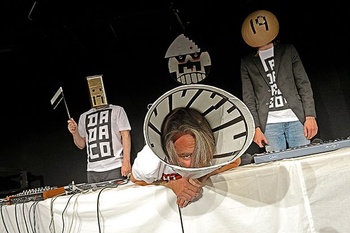(© Andreas Etter)
The Kaaitheater is presenting one last evening with two performances by two artists. While Davis Freeman looks at violence in his award-winning What You Need to Know, we quizzed andcompany&Co. from Berlin about the different meanings of the German word Kriegserklärung.
The “Co” in andcompany&Co. stands, among other things, for communication, commemoration, and collective. The Berlin performance collective, with a core membership of three, has appeared twice in the past at the Kunstenfestivaldesarts. War has been one of their preoccupations for quite some time – and this time they are coming to make an actual declaration of war. “This performance developed out of the realisation that wars, until the First World War, always officially began with a declaration of war, but after that they didn’t,” says Alexander Karschnia. “That’s something that has become topical now with the commemorations of the First World War, which – looking back – many say never ended. The Second World War was just a continuation of the First.”
Kriegserklärung is a play on words.
Alexander Karschnia: We play with the double meaning of the word “Kriegserklärung” [Erklärung means “declaration” as well as “explanation” – MB]. So, by saying that we are starting the war, we are also saying that we want to explain it and even, in that way, end it. We combine that with the question of just what performative expression actually is. For a declaration of war is a performative expression: saying something or writing it down becomes a deed. You end the war by saying that you are ending it. As performers, we too make no distinction between saying and doing.
But how do you make the connection between war and performance?
Karschnia: We focus on just one of the elements that paved the way for the end of the First World War. That is the Russian Revolution, which might never have happened if the German army hadn’t smuggled Lenin from his exile in Zurich to Russia. Lenin pulled out of the war in a way that was highly unfavourable for Russia, because he wanted peace straight away to get the Russians on his side, even if that cost Russia territory. It’s interesting to know that Lenin, when he was in Zurich, lived in the street where the Dada movement’s Cabaret Voltaire was located. Dada combined radical, nonsensical art with radical anti-war sentiment. They saw Europa as a madhouse and exaggerated everything. And, of course, people speculate about whether Lenin ever went to the Cabaret Voltaire.
In any case, we combine Lenin and Dada. The Dadaists were also the fathers of performance art. With their sound poetry and their subversion of all rules and all meaning, they began a tradition that still has a lot of followers. Ernst Jandl, for example, an Austrian sound poet who says the word “Schützengraben” (trench) in such a way that it sounds like he is shooting. In Sounds like War, we play with that tradition of sound poetry and make a musical collage about war that also sounds like a war.
Art that fights against war with its own weapons?
Karschnia: Exactly. Artists have often exploited technology that came out of war industry: radio, stereo, studio techniques, etc. But today we see that war industry is also making use of art: dropping sound bombs and using music to torture people. That reversal is interesting. But we won’t be bombarding the audience’s ears during the show: we keep it lo-fi.
SOUNDS LIKE WAR: KRIEGSERKLÄRUNG + WHAT YOU NEED TO KNOW • 13 & 14/1, 20.30, €8/10/12, Kaaistudio’s, Onze-Lieve-Vrouw van Vaakstraat 81 rue Notre-Dame du Sommeil, Brussel/Bruxelles, 02-201.59.59, www.kaaitheater.be

Fijn dat je wil reageren. Wie reageert, gaat akkoord met onze huisregels. Hoe reageren via Disqus? Een woordje uitleg.